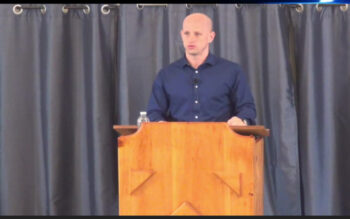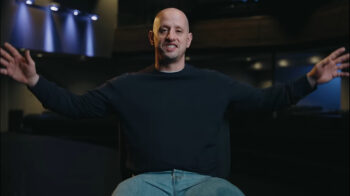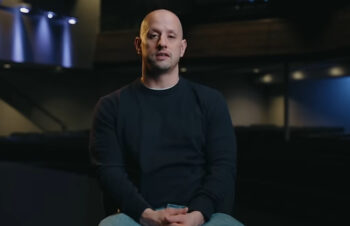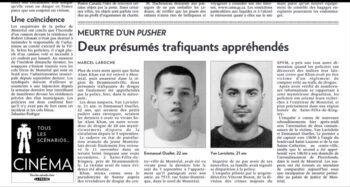Manny’s mom sat him down one day and explained to him the three rules of life: Never become a cop. Never join the army. Never become a priest.
So when he got kicked out of school for selling marijuana, her response was to ask for some to smoke herself.
”Go to Your room, I know you have a stash somewhere. Get that stash and bring it here,” she told him. “She kept that stash for herself.
”There was no sense that what I was doing was wrong,” he adds on a Witness Testimonies video on YouTube. “Everything was acceptable as long as I made money.”
Emanuel Ouellet was raised in Montreal, Canada, by a single mother who struggled with substance-abuse. The phrase she kept saying to her son, Manny, was, If you don’t like it why don’t you just move out like your father?
 “That left me feeling like I wasn’t legitimate, like I didn’t belong, like I was a visitor,” Manny says. “I always sought to perform better to be received, to be loved, to be accepted.”
“That left me feeling like I wasn’t legitimate, like I didn’t belong, like I was a visitor,” Manny says. “I always sought to perform better to be received, to be loved, to be accepted.”
Very early on, Manny decided that the root of all of his problems was the lack of money. He stole some marijuana from his mom and to sell at school. Soon he got marijuana from his own sources to sell at school.
When he got kicked out of school, he began selling at another school. He was able to buy new clothes and acquired a status among the students.
When he began smoking marijuana himself, it diminished his profits. He needed more. So the dealers he dealt with suggested he sell crack.
 At age 16, he got his own street corner and was making usually over $500 a day.
At age 16, he got his own street corner and was making usually over $500 a day.
He no longer had marijuana, so his mom was upset that she could no longer get from him.
“What kind of drug dealer are you that you don’t have any weed?” she challenged him one day.
“I’m not selling weed anymore,” he replied. “I’m selling crack.”
Mom kicked him out, and it didn’t really bother him since he was paying the bills anyway. He trafficked out of a hotel room in downtown Montreal.
One day, there was a knock on his door late one night when he had sold out everything. Thinking it was another customer, he yelled through the door, I’m all out please leave. But the person kept knocking.
Eventually, he opened the door and two friends walked in. “My condolences,“ one said.
“As I heard this, I knew my mother had committed suicide,” he said. “Throughout my whole childhood, she would always threaten to commit suicide.”
Manny had learned to be without feeling, so he didn’t cry. Instead, he lit a cigarette and sat on the bed. “She’s so stupid,” he said over and over again.
Years later, his friends marveled at how cold and unfeeling he appeared at that moment, but for Manny it was a source of pride and manliness.
He tried to reform his ways, return to school at 17. Very graciously, his godfather took him in. When he turned 18 at the end of the school year, his godfather told him to get a job or move out.
“I think he really intended it for me to be a motivation to find a job,” Manny says. “ But at that point, I did take it like a threat that I had heard so many times in my life. I was so familiar with what my mom said that if I was not happy to move out. So I moved out.”
Straight back to selling crack.
At age 18, he went to a party after which he was stabbed. He realized he was bleeding to death, but he couldn’t flag down a patrol car. Two passed. As a third approached, he stood in front of it.
By the time his body arrived at the hospital, he was clinically dead. The doctors revived him. After three days in ICU, he was transferred to a regular room. He continued to smoke even in the hospital, and this displeased the nurses who told him that if he didn’t stop smoking, he would have to leave.
There it was again, the refrain he hated so much in life. Leave.
So he left. Back to the streets and back to selling crack.
He built a team without interruption. “We were selling quite a bit of product,” he says.
After a vacation of two days, he came back and examined the numbers. They didn’t add up. Upon further scrutiny he figured out the shift and the person who blew it.
He confronted Sonny on the street. Sonny denied it. But after some prodding, he confessed to working with another dealer.
One of the rules on the street is loyalty, so violation of trust was a serious problem. “It was clear in my mind,” he says. “I made my decision. It was a terminal decision.”
His buddy rented an untraceable car. They picked up Sonny, drove to Drummondville and out into the woods.
”In my coldness and in my insensitivity, I shot Sonny and left him to die there in the woods,” he narrates.
It was 2003. A couple months later, police found the body. One month after, Manny was arrested and charged with first-degree murder. After a two year trial, he was found guilty and condemned to life in prison without the chance for parole for 25 years.

In jail, he sold crack — again. Money was still the answer.
“I was soon caught and shipped to a maximum security penitentiary,” he says. “For the first time I came to the realization of where I was and what my situation was.”
He decided to start to change but didn’t know how. He turned to the prison library. He would take advantage of his time to read every classic, he decided.
By chance, he picked up Hemingway’s For Whom the Bell Tolls. From the first page he was confronted with lines from John Donne’s poem: No man is an island,
Entire of itself… Each man’s death diminishes me, For I am involved in mankind.
”I realized that any man’s death diminishes me, but I had killed someone,” he says. “Prior to that I had always seen everybody as prey or predator. In that moment, the idea of being part of humanity entered my mind for the first time.”
Wanting to explore ideas, he talked with the chaplain. He was impressed. The guy was big but gentle. In the streets, big guys were aggressive.
He resisted going to chapel for a long time. When he finally did go, he resisted receiving Jesus.
“You don’t understand. I killed a man,” he told the guy who asked him if he wanted to get saved.
“The guy laughed and walked away and got a Gideon‘s new testament,” Manny remembers. With joy and peace, he showed Manny the story of Paul, who participated in the murder of Stephen.
“Paul was a murderer and God still used him to write 2/3 of the new testament,” Many realized. “I had no more objections, no more defenses, so I prayed to receive Jesus Christ as my Lord with him.”
Manny threw himself into Bible reading. ”My life progressively started changing as I read the word,” he says. “For the first time I learned that I was living the wrong way. I never knew that there was something better than to live in the flesh.”
He grew in God. In 2019, he got a reevaluation hearing in court. He testified about how Jesus had changed him. His release dates were changed and Manny got out Aug. 19, 2021.
Today he attends church. He’s a leader in ministry. He creates Christian content for his he Internet.
“I tell people to understand who Jesus Christ is, and what his sacrifice means for our lives,” Manny says. “If they repent, they will see their lives changed.”
To learn more about a personal relationship with Jesus, click here.
Related articles:
- A wristband led to her salvation
- He was raised by two lesbian mothers
- A Japanese atheist finds Jesus
- He turned to Christ because a Muslim tried to lead him to Allah.
About this writer: Michael Ashcraft pastors a church in the San Fernando Valley of Los Angeles





